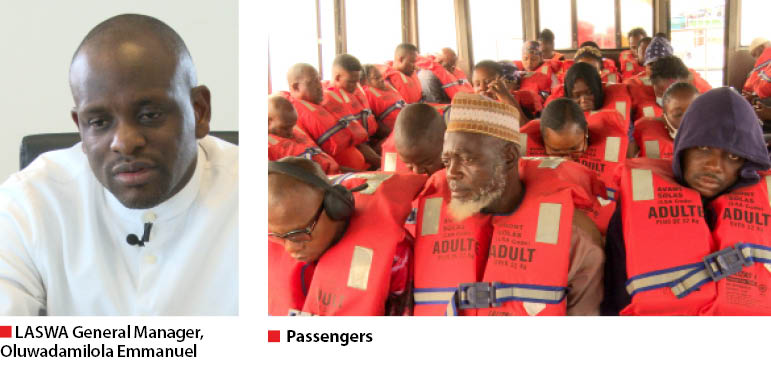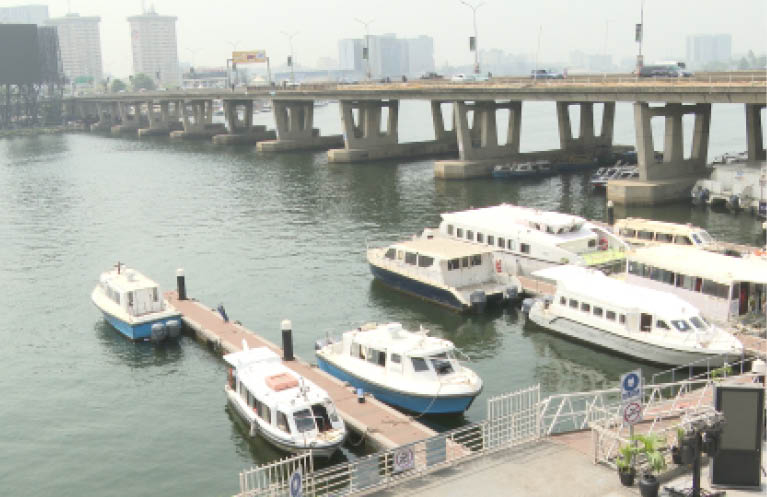The ‘burgeoning’ Lagos water transport system
Water transportation is an integral component of the development of Lagos State’s inter-modal transport system. The physical environment is well-suited to accommodate water transport as about 17 per cent of the state is composed of lagoons and waterways. In this report, Daily Trust on Saturday looks at how the state is developing its water transport […]

Water transportation is an integral component of the development of Lagos State’s inter-modal transport system. The physical environment is well-suited to accommodate water transport as about 17 per cent of the state is composed of lagoons and waterways. In this report, Daily Trust on Saturday looks at how the state is developing its water transport system to ease the burden on roads and their chaotic gridlocks.
One of the several challenges of a mega city like Lagos is the exhausting and stressful way the road transport systems work.
In Lagos, the road transport system is inadequate and chaotic for the growing urban population of over 20 million people, most of who waste productive man hours in traffic.
The state government is enhancing the water transport system as a viable option to escape the gridlock on the roads. The waterways is an alternative means of transportation with 34 routes connecting different parts of Lagos.
- New notes: Emefiele begs Nigerians to endure challenges
- Chelsea spend more than German, Spanish, French & Italian Leagues Combined!
Ikorodu is one of the areas in Lagos where water transportation is booming due to heavy congestion on the roads.
At the Ikorodu Ferry Terminal, residents of the state park their vehicles at the garage and fill out their profiles before boarding the ferries to their different destinations. Although the cost of the water transport system is on the high side, passengers said they do not mind paying because according to them, it’s safer and less stressful.
Omotunde Owolabi, a business owner, said using the waterways has helped her business a lot, she gets to her place of business on time and makes more sales.

“The waterways are safer and faster, it takes me about 25 minutes to get to my destination. I get cranky when I miss the boat because I would have to spend about four hours in traffic and I would lose lots of productive hours on the road. Even though the cost is on the high side, I still prefer it because it’s less stressful,” she said.
Another business owner, Shode Basirat, said “the ferry terminal is very good compared to the road where you spend three to four hours in traffic but you only spend twenty minutes when you use the waterways. The only issue is the high cost of the transport fare which is mainly because of the fuel scarcity; it was N600 or N700 before but now it’s between N1000 and N1,300. We want the government to subsidize the fuel so that the boat fares can be reduced.”
Teller Israel, a captain of one of the ferries, tells our reporter the challenges he faces with passengers. He said there is the need to orientate and sensitize passengers on safety guidelines.
“My personal challenge with my passengers for the few years I have been working here is on the issue of safety. Most passengers reject using the life jackets given to them. Some passengers blatantly ignore the safety guidelines given to them and they often disrespect us.
“There’s the need for the state government to do proper orientation and sensitization of passengers so that they are cognizant of the various safety guidelines,” he said
Israel also said the government still has a lot to do in improving the water transportation system.
“We have too much dirt and timber wood on the water which damages our boats, the government should put in place an operation that will help in clearing the dirt from time to time. We also need enough rescue boats from the government, right now we only have two patrol boats from Lagos State Waterways Authority and it’s not enough. Most times when there’s an emergency, we mostly help ourselves,” he said.
Another captain, Ademola Abazre, said the government should get more involved and also empower them.
He said, “the government should empower us by giving us better engines, most of the engines we use are always faulty and the spare parts we buy to fix them are always very expensive. The government should look into it for us.”
Safety, investments and over one million passengers
The authority is aware of the challenges according to the general manager Lagos State Waterways Authority (LASWA), Oluwadamilola Emmanuel, who told Daily Trust on Sunday that the government is addressing them.
“The state government has invested quite significantly in water transportation. What the state government has been doing is looking at the possible challenges the passengers and operators are facing. One of those critical things is around safety, and what the government has been doing is to build a safety system for the people to make it safer for them to use.
“Government has done many things to improve water transportation in the state and some of these are the first of its kind waterways monitoring and data management centre which is otherwise called a waterways control room. So, right from our stead here in Falomo, we can see several locations on what’s going on the waterways, how boats are moving and we are able to generate reliable data that is helping us make decisions. The government has also been able to donate life jackets year in, year out to existing boat operators,” he said.
He added that apart from enforcing and penalising operators using substandard life jackets, he said the authority also supports them by donating life jackets because the water transport sector is capital intensive.
“There’s also the bi-annual inspection which we carry out to ensure that the boats are in good order. The state government has also increased the monitoring and patrol fleet and that has helped us to adequately monitor our waterways; and of course, we also have what we call Waterways LASMA to ensure boat operators are abiding by the rules and regulations, we increased that number from 48 to 108, to enable us cover more locations. Last year, they were only two major incident – waterways incident that occurred. Prior to that time, we used to have about 8, 9 or 10. So, that shows that the government has been intentional and strategies have been put in place to ensure that the waterways are safer,” he said.
He called on Nigerians to take good care of the environment so that the waterways can always be in good condition.
“Please let’s stop littering our environment because every time you litter your environment, that waste finds its way into the waterways. This is a collective responsibility for all of us,” he said.
Emmanuel said the state government has introduced an Integrated Multi-modal Transport System where the rails will connect to the road and the water will connect to the road. According to him, with this, there will be more awareness on letting the people know they have different options to get to their destinations.
He said the state waterways authority has 20 boats in its fleet which cover 10 major routes on the waterways.
“The 20 boats on the Lagos ferry services fleet goes as much as 10 major routes on the water ways. They go from Ijede to Badure, from Ikorodu to Falomo, Badure to Falomo, from Ojo to Marina, Mile 2 to Marina, Badagry to Marina, we also have tourist services to Ilashe and Igbeshe,” he added.
He called on the private sector to bring in more boats and to work together with the state government to ensure a functional and robust transportation system in the state.
Adekoya Adebowale, a safety personnel who works for the LASWA, explained that the government has put rescue measures in place to attend to emergencies.
“I would like to thank the Lagos State government for the emergency response that they have put in place. We have a special team called Lagos state Safety Emergency Response which we have as a separate department. As safety personnel on the jetty, we monitor the boarding and discharging of passengers.”
“In case of emergencies, we have a satellite that covers the waterways, we have a control room that reads whatever goes on in the waterway and with that, we get to know if there’s an incident even before a captain calls in and we respond immediately. We have a medical team on standby to treat passengers who get water sick. Most of the passengers are not used to the water system but they use just to get to their destination fast enough. That is why the Lagos State government is providing all the necessary equipment to avoid casualties on the waterways,” he said.
LASWA confirmed that over one million Lagosians use the water transportation system every month and the figure keeps rising.
